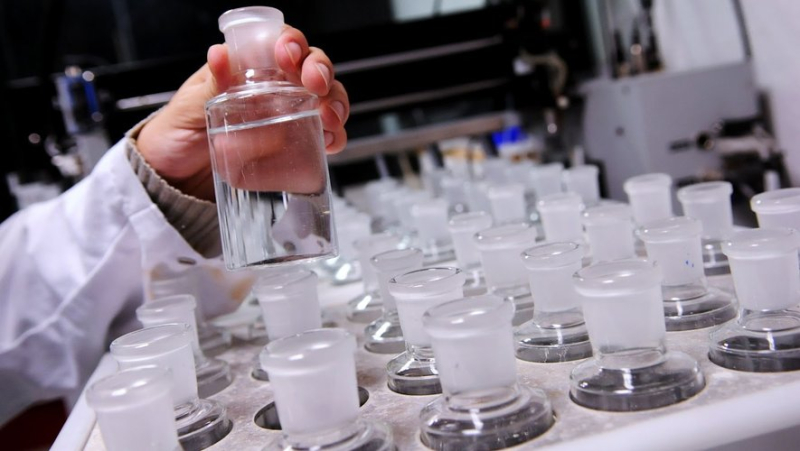Eternal pollutants: stoves, clothes… will products containing PFAS soon be less manufactured and less sold ?

The obligation to control the presence of PFAS in drinking water throughout the territory appears in the proposed law (photo illustration). GILLES LEFRANCQ – Midi Libre
A reprieve for eternal pollutants ? The deputies are considering this Thursday, April 4, 2024, a proposed law aimed at restricting the manufacture and sale of products containing PFAS, the adoption of which is uncertain in the face of reservations from the presidential camp, under pressure from industrialists.
Massively present in everyday life (Teflon pans, food packaging, textiles, automobiles, etc.), these per- and polyfluoroalkyl substances called PFAS (pronounced "pifasse") owe their nickname for their very long life cycle and, for some, their harmful effect on health.
At first glance consensual, the bill presented by ecologist Nicolas Thierry, first of eight texts presented by his group within the framework of its parliamentary niche, should ultimately be hotly debated.
Fighting "at European level"
The government highlighted the work underway at European level on Wednesday. "It's at the European level that we must fight on this subject, the European lever is the right lever" in order not to weaken French industry at the expense of those of neighboring countries, declared Prime Minister Gabriel Attal in the hemicycle.
The European Chemicals Agency published in 2023 a draft ban moving in the direction of a broad restriction of PFAS. But "this initiative is conditional on a long decision-making process and could result in the most favorable scenario by 2027-2028", according to Mr. Thierry.
The text of the deputy for Gironde aims to reduce the population's exposure to these molecules, by prohibiting the manufacture, import, export and marketing of certain products which contain them.
In its initial version, it planned to ban the use of PFAS by July 2025 for certain products, and 2027 for others, with a deadline of July 2025 for certain products and 2027 for others. possible exemptions. In order to obtain a majority in the Sustainable Development Committee last week, Mr. Thierry agreed to restrict its ambition.
What deadline ?
The version presented in the hemicycle thus provides for a ban from January 1, 2026 on any kitchen utensil, cosmetic product, wax product (for skis) or textile clothing product containing per- and polyfluoroalkyl substances, with the exception of protective clothing for security and civil security professionals.
All textiles would be affected by the ban from January 1, 2030. The packaging sector, however, falls outside the scope of the law, to the extent that a European regulation must "very soon" regulate it more strictly.
Other measures, the obligation to control the presence of PFAS in drinking water throughout the territory and the application of the polluter pays principle with a tax aimed at industrialists who reject it.
"Don't touch my frying pan"
Despite this rewriting, the text continues to arouse reluctance.
Author of a report in February that called for "urgently stop industrial discharges" containing eternal pollutants "without waiting for European restrictions", the MoDem deputy Cyrille Isaac-Sibille tabled an amendment which plans to postpone the ban applied to kitchen utensils to January 1, 2030.
A position taken concomitantly with the mobilization of the kitchenware manufacturer Seb, who this week brandished the threat that such a law would pose to the industry. job.
On Wednesday, hundreds of employees supported by their management organized a potluck near the National Assembly to demand "withdrawal" of the text. "Don't touch my frying pan", we could read on the signs.
"The future will be written without eternal pollutants"
The law would threaten 3,000 jobs at the Seb factories in Rumilly (Haute-Savoie) and Tournus (Saône-et-Loire) which notably manufacture Tefal stoves, and the polytetrafluoroethene used for the coating of the latter would not be dangerous, according to the group.
Questioned by AFP, Mr. Thierry denounced the "somewhat crude lobbying" of an industrialist who "disseminates scientifically erroneous information" and who makes a < em>"classic blackmail for employment" while "the future is&# 39;will write without eternal pollutant" and that alternatives already exist for culinary products.
"An eternity"
"If, on such a serious public health subject, when there is a scientific, political, citizen consensus, we do not act, when do we do it ?", he was alarmed.
According to Jean-Marc Zulesi (Renaissance), president of the Sustainable Development Committee, the position of the Macronist group is "not stabilized" ;. If some want to reject the text, others argue for pushing back the deadline from 2026 to 2030. "An eternity" for Mr. Thierry.




